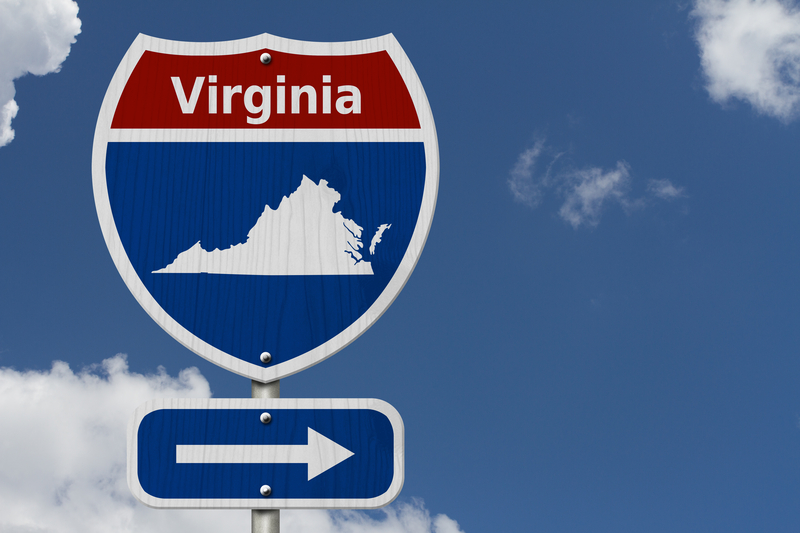Virginia’s trucking insurance requirements align with FMCSA federal guidelines while a new insurance player finally brings competition to lower premiums.
VDMV requires Motor Carriers hauling freight for hire across state lines to have a USDOT number.
VDMV is the Virginia Department of Motor Vehicles.
It’s FMCSA that issues your DOT number.
The U.S. Department of Transportation is overseen by FMCSA, the Federal Motor Carrier Safety Administration.
Required Proof of Insurance for Virginia Motor Carriers:
Here’s how a new trucker’s proof of insurance works in Virginia:
1. Start by applying to become a Motor Carrier and obtain a fresh DOT number via the FMCSA Unified Registration System.
2. Your insurance company will submit proof of your coverage to the FMCSA by linking it to your new DOT number.
3. This submission of insurance proof is referred to as your BMC-91X Filing.
4. The MCS-90 serves as an endorsement to your policy, ensuring compliance with the FMCSA – think of it as a Bond.
5. At the same time, your insurance provider also sends proof of your coverage to the Virginia DMV.
6. You receive your MC, or Motor Carrier number and operating authority from FMCSA within 30 days or so.
Remember, when you team up with a professional Truck Insurance Broker, she’ll guide you through this process and offer additional advice at no cost over the phone.Working with an insurance agent doesn’t cost you extra compared to going direct, and you get personalized attention that fits your needs for free.
But hold off on getting that new DOT number just yet!
Before you dive in to becoming a Motor Carrier, make sure the insurance fits your budget.
Reach out to us first to get an idea of your trucking insurance premiums.
It’s smart to know your potential costs before starting a new gig, especially in trucking where premiums can vary.
Starting off on the right foot will save you time and energy because things can get complex.
Depending on your truck type and where you live, you might be better off hauling for others until you have your ducks in a row.
Let’s chat about it together.
Why is Trucking Insurance so pricey for New Start Up Motor Carriers in Virginia?
The pool of companies offering Trucking Insurance is small. This is due to bad underwriting outcomes and steep legal costs, which have deterred new entrants. A company needs to have substantial financial chops and solid underwriting performance to step into the trucking insurance arena.
But there is Exciting News for Virginia Motor Carriers – A new trucking insurance company has just hit the scene
A major financial player is rolling out a fresh insurance option for both seasoned Motor Carriers and new Mom and Pop Trucking for Hire startups.
The nationwide launch includes Virginia plus Arizona, Arkansas, Colorado, Florida, Illinois, Indiana, Oklahoma, Oregon, South Carolina and Texas with more states rolling out in the coming months.
This program, now live with select Independent Agents, offers super competitive premiums over the current dominant trucking insurance players.
CIS is thrilled to partner with them, and we’d love to tell you all about it:
Virginia GEICO Commercial Truck Insurance
Give us a buzz today at CIS: 330-864-1511.
15 Minutes Can Save You BIG $$$ on your Trucking Insurance!
Trucking Insurance Limits for Virginia Motor Carriers:
FMCSA and Virginia stick to the same minimum insurance limits for vehicles hauling freight for hire across state lines:
- Cargo Van and Sprinter Insurance: $300,000 CSL Commercial Auto Liability Coverage
- Hot Shot Truckers Insurance and other over 10K GVW Units: $750,000 CSL Commercial Auto Liability Coverage
CSL – Combined Single Limit
Just an FYI: Brokers and customers usually lean towards the $1,000,000 CSL Liability as the industry norm.
So while starting with the minimum is okay, it’s wise to factor in the eventual cost of $1,000,000 in Liability.
What exactly IS Commercial Auto Liability for truckers?
It’s there to protect others when you’re driving your truck and accidentally hit someone or something.
Commercial Auto Liability for truckers has two parts:
Bodily Injury Liability – Covers accidents you cause involving injuries and costs to other people.
Property Damage Liability – Covers damage you’ve caused for vehicles or property belonging to other people.
So when you buy $1 million in Commercial Auto Liability you are insured for that total amount between Bodily Injury and Property Damage.
Truckers General Liability is different than Truckers Commercial Auto Liability
Commercial Auto Liability covers you when you’re driving your truck.
While General Liability covers you for things that can happen when you’re not driving your truck.
The most common General Liability claim is for delivery mishaps that can occur while loading and loading. However, there are many other Examples of General Liability for Truckers that can come into play.
It’s very affordable coverage, so be sure to ask about it when you’re talking with your Trucking Insurance Pro. Your customers may require this proof of extra liability coverage before allowing you onto their premises.
Physical Damage Insurance covers the truck itself
Collision insurance kicks in if your truck gets banged up in an accident, flips, or rolls over.
Comprehensive pretty much covers everything else – like theft, fire, vandalism, hail, falling trees, animal run-ins, and cracked windshields.
When you buy physical damage coverage for your truck, the value is based on the Stated Amount or its Actual Cash Value (ACV).
Remember to factor in any permanently attached gear when figuring out your truck’s value – whether it’s a fancy paint job, electronics, or a sleeper cab.
Trucking Insurance extras to remember:
– If the driver who hits YOU doesn’t have enough insurance, then your own Uninsured or Underinsured (UM/UIM) Bodily Injury Protection has your back. It covers injuries for you and your passengers, including any out-of-pocket costs.
– Medical Payments (MedPay) Protection helps with medical and funeral expenses if you or your passengers are injured in a crash.
These are both affordable extras, and a good truck insurance broker will usually include them in your proposal.
She can also guide you on the right amount and type of Motor Truck Cargo coverage you’ll need to get started hauling freight for hire.
Before diving into starting your DOT Authority, be sure to check out our CIS Commercial Truck Insurance Blog for Owner Operators.
Feel free to reach out to us at CIS anytime 330-864-1511
We love to connect with new Motor Carriers and talk about hitting the road on the right foot!

Authors
Shelly Benisch, CIC, TRS started Commercial Insurance Solutions, Inc. (CIS) in 2002 and brings over 30 years of experience in Commercial Truck Insurance. As one of the top 25 Progressive Truck Insurance Agency Leaders in 2024, she helps small Motor Carriers and Owner Operators across the country find affordable trucking insurance quotes with GEICO, Progressive and more. Shelly also writes a free Trucking Blog packed with insurance tips for all kinds of Small Carriers. Her team of Truck Insurance Experts have earned CIS consistent 5-star Google reviews and Progressive's Top 25 Truck Elite Status. For expert Commercial Truck Insurance advice, give Shelly a call at (330) 864-1511 #CISDoesThat Commercial Truck Insurance for owner operators and small motor carriers.
CEOChristina Cummings, TRS certified, leads Commercial Insurance Solutions, Inc. (CIS) as Executive Director and true experienced advice on Commercial Truck Insurance. She secures the most affordable GEICO quotes and Progressive quotes...and more for small Motor Carriers and Owner Operators nationwide. She is your "go to" person at CIS for advice with underwriting questions, tips and networking opportunities for Small Truckers. Under her leadership CIS earned Progressive's Top 25 Truck Elite status in 2024 and consistent 5-Star Google reviews. She also co-authors the free CIS Commercial Truck Insurance Blog for small Motor Carriers and Owner Operators, sharing her bottom line tips on how to find more affordable Commercial Truck Insurance. Looking for expert trucking insurance advice–Christina is your go to leader at (330) 864-1511 #CISDoesThat

